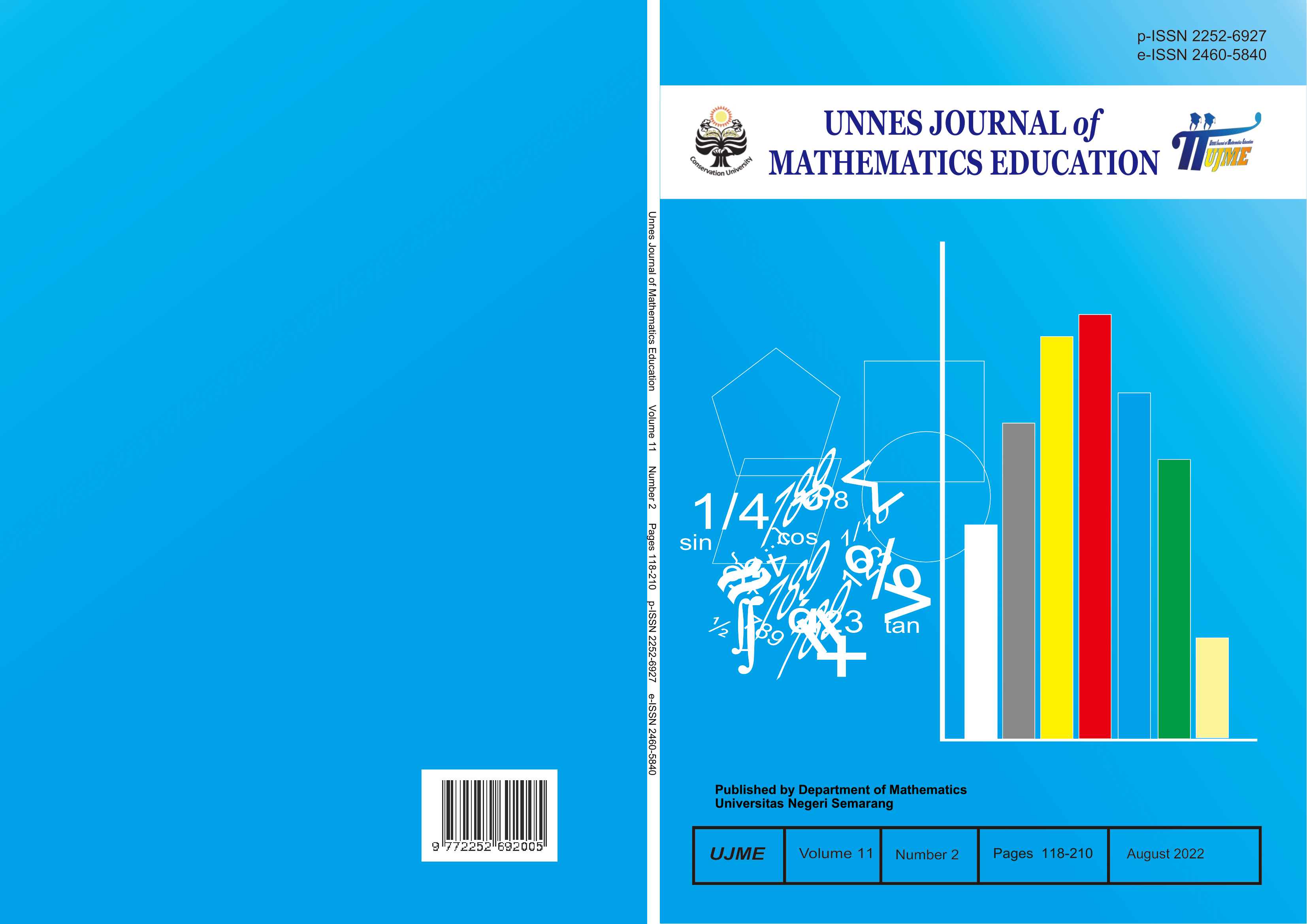Mathematical Critical Thinking Ability in DAPIC Problem Solving Learning with Scientific-RME Approach in Students Learning Independent
##plugins.themes.academic_pro.article.main##
Abstract
Mathematical critical thinking ability is an ability that students in learning mathematics must possess. The purpose of this study was to analyze critical thinking ability reviewed from independence tend and to describe students’ critical thinking ability on DAPIC Problem Solving in independence tend. The population in the study were all students of class VIII Junior High School 43 Semarang Year 2020/2021. The research method used was a mixed method with a sequential explanatory design. Research results showed that: (1) students' mathematical critical thinking skills in DAPIC Problem Solving learning with the Scientific-RME approach could achieve minimum completeness criteria; (2) students' mathematical critical thinking skills in DAPIC Problem Solving learning with the Scientific-RME approach achieved classical learning completeness; (3) average critical thinking ability in the DAPIC Problem Solving learning with the Scientific-RME approach more than from Problem Based Learning; (4) proportion result test critical thinking ability in the DAPIC Problem Solving learning approach Scientific-RME is better than Problem Based Learning; (5) critical thinking ability with five indicators think critical is in the subject category high, moderate, and low learning independence tend.
##plugins.themes.academic_pro.article.details##
References
Aryanta, I. K. D. (2020). Implementasi Aplikasi UKBM berorientasi STEM untuk meningkatkan hasil belajar fisika siswa. Indonesian Journal of Educational Development, 1(3), 357-365.
Asmar, A., & Delyana, H. (2020). HUBUNGAN KEMANDIRIAN BELAJAR TERHADAP KEMAMPUAN BERPIKIR KRITIS MELALUI PENGGUNAAN SOFTWARE GEOGEBRA. Jurnal Program Studi Pendidikan Matematika, 9(2), 221–230.
Ayu, O., Dewi, S., & Winarti, E. R. (2019). Students ’ creative thinking ability in solving problems with double loop problem solving model. 8(2), 111–118. https://doi.org/10.15294/ujme.v8i2.31718
Do, T. T., Hoang, K. C., Do, T., Trinh, T. P. T., Nguyen, D. N., Tran, T., ... & Nguyen, T. T. (2021). Factors Influencing Teachers' Intentions to Use Realistic Mathematics Education in Vietnam: An Extension of the Theory of Planned Behavior. Journal on Mathematics Education, 12(2), 331-348.
Liana, D. (2020). Berpikir Kritis Melalui Pendekatan Saintifik. Mitra PGMI, 6(1), 15-27.
Makur, A. P., Jehadus, E., Fedi, S., Jelatu, S., Murni, V., & Raga, P. (2021). Kemandirian Belajar Mahasiswa dalam Pembelajaran Jarak Jauh Selama Masa Pandemi. Mosharafa: Jurnal Pendidikan Matematika, 10(1), 1-12.
Millaty, V. N. (2021). Pengaruh Kemandirian Belajar terhadap Kemampuan Koneksi Matematis Siswa pada Materi Segiempat. Jurnal Didactical Mathematics, 3(1), 33-40.
Putridayani, I. B., & Chotimah, S. (2018). Analisis Kesulitan Belajar Siswa Dalam Menyelesaikan Soal. Jurnal IKIP Siliwangi, 7(May), 57–62.
Rahmayanti, N., Yonanda, D. A., & Kurino, Y. D. (2021, September). Penggunaan Media Papan Musi (Multifungsi) Untuk Meningkatkan Hasil Belajar Siswa Dalam Mata Pelajaran Matematika. In Prosiding Seminar Nasional Pendidikan (Vol. 3, pp. 118-122).
Risnanosanti, & Ristontowi. (2019). Developing students ’ mathematical literacy through DAPIC problem solving process. Journal of Physics: Conference Series, 6–11. https://doi.org/10.1088/1742-6596/1321/2/022125
Rodiah, A. (2020). KEMAMPUAN PEMECAHAN MASALAH MATEMATIS PADA PROJECT BASED LEARNING BERBANTUAN LEARNING LOG DITINJAU DARI KEMANDIRIAN BELAJAR SISWA. Under Graduates thesis, UNNES.
Setiana, D. S., & Purwoko, R. Y. (2020). Analisis kemampuan berpikir kritis ditinjau dari gaya belajar matematika siswa. Jurnal Riset Pendidikan Matematika, 7(2), 163–177. Retrieved from https://journal.uny.ac.id/index.php/jrpm/article/view/34290
Sipayung, T. N., Imelda, Siswono, T. Y. E., & Masriyah. (2022). An analysis of students learning independence in mathematics based on google classroom. Journal of Physics: Conference Series. https://doi.org/10.1088/1742-6596/2157/1/012037
Suh, J., Matson, K., Seshaiyer, P., Jamieson, S., & Tate, H. (2021). Mathematical modeling as a catalyst for equitable mathematics instruction: Preparing teachers and young learners with 21st century skills. Mathematics, 9(2), 162.
Sumirattana, S., Makanong, A., & Thipkong, S. (2017). Using realistic mathematics education and the DAPIC problem-solving process to enhance secondary school students’ mathematical literacy. Kasetsart Journal of Social Sciences, 38(3), 307–315. https://doi.org/10.1016/j.kjss.2016.06.001
Umam, K., & Susandi, A. D. (2022). Critical Thinking Skills: Error Identifications on Students' with APOS Theory. International Journal of Evaluation and Research in Education, 11(1), 182-192.
Utari, D. R., Wardana, M. Y. S., & Damayani, A. T. (2019). Analisis Kesulitan Belajar Matematika dalam Menyelesaikan Soal Cerita. Jurnal Ilmiah Sekolah Dasar, 3(4), 545. https://doi.org/10.23887/jisd.v3i4.22311
Wardono, W., Mariani, S., Rahayuningsih, R. T., & Winarti, E. R. (2018). Mathematical literacy ability of 9th grade students according to learning styles in Problem Based Learning-Realistic approach with Edmodo. Unnes Journal of Mathematics Education, 7(1), 48-56.
